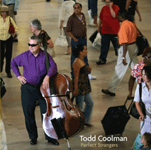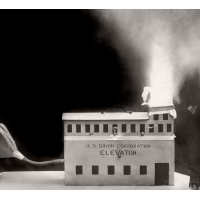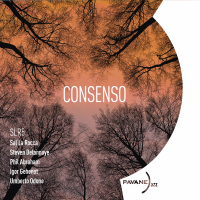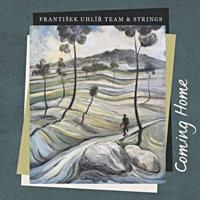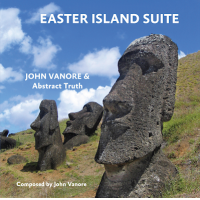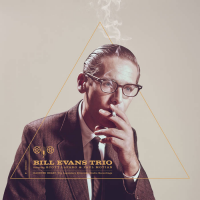Home » Jazz Articles » Multiple Reviews » Louis Moholo: with the Chris McGregor Trio and Marilyn Crispell
Louis Moholo: with the Chris McGregor Trio and Marilyn Crispell
As the last surviving member of the original Blue Notes, Moholo (who as the last surviving member of his clan has taken the surname Moholo-Moholo) has returned to South Africa but still makes frequent engagements in Europe and even, on occasion, the United States. Chris McGregor Trio
Chris McGregor Trio
Our Prayer
Fledg'ling
2008
Our Prayer was recorded in 1969 as part of a pair of records slated for issue on the Polydor label. Though test pressings were made, this set and its septet companion, Up To Earth, remained commercially unissued until now. Our Prayer finds McGregor and Moholo in a trio with American bassist Barre Phillips, who was living in London and working with classical composer Max Schubel and reedman John Surman.
The set starts with the kwela-inspired "Church Mouse," Phillips' arco in thematic counterpoint to an almost gospel-tinged left hand from McGregor. After the brief theme, piano and bass lengthen their lines, McGregor spinning floridly outward with his right hand, leaning in with wrists and palms as Phillips dissects and eddies behind him. His short solo echoes both Paul Chambers and Ronnie Boykins. Moholo is rock-steady here, providing a base from which the triangle's other two sides can fly out. On "Moonlight Aloe" (also recorded by the septet), he deftly walks around sketchy string and piano phrases, or accelerates the rhythm toward an abrupt inversion or an outright halt. McGregor knits crystalline filigree around Phillips' high harmonics, a tone poem from the hands of someone normally heard pushing a caterwauling saxophone section.
It's refreshing to hear the pianist in an open situation, proving he could be in the ilk of Tippett or Howard Riley. The title track is a sprawling free improvisation, finding wooden flutes, slide whistles, voice, castanets, an egg timer, lamellaphone and triangles among the trio's tools. McGregor's piano at the outset echoes a meatier Satie as Moholo's pulse, sharp and staccato, expands and contracts, at times jouncy and floating along and at others spitting McGregor's phrases back in triplicate. Pounding arcs of left and right hands, deftness and sweat of horsehairs on strings, three musicians chasing one another from bebop to the townships and into areas of immediate invention (col legno merging with metal percussion and classicism), it's hard not to want this trio to have been an influence on UK free piano music to come. Louis Moholo-Moholo
Louis Moholo-Moholo
Duets with Marilyn Crispell: Sibanye (We Are One)
Intakt
2008
Sibanye (We Are One) is the first meeting of Moholo-Moholo with pianist Marilyn Crispell, and the seven improvisations on offer here are all first takes sans rehearsal. The drummer has worked in stripped-down contexts with other pianists before—a 1987 duo with Irene Schweizer was waxed for Intakt, a spinoff from their high-octane trio of years before. Moholo and Tippett had a trio with English saxophonist Larry Stabbins that resulted in Tern (SAJ, 1981). But whereas Schweizer and McGregor are pianists whose drive rests on rhythm, and Tippett modal volcanism, Crispell's lines follow the romantic impulse into tonal-rhythmic rabbit holes. In a way, she's the drummer's perfect complement for they both utilize repetition, inversion and subtle abstraction to destabilize concrete notions of pattern.
The opening duet, "Improvise, Don't Compromise," finds the pianist probing atonal meditations over ringing cymbals and tom patter, Moholo echoing phrases in mallet cascades and space between hi-hats, a steady breath-like canvas. Rather than spitting phrases back at one another in a duel, the pair draws out a collective flight which is seamless and without anticipation. Crispell layers additive cells a la unit structures ten minutes on, Moholo skittering in ballet slippers to turn the screws.
Yet there's a poignant sense of history to Moholo's presence here; in "Journey" he whispers rhythmic alliteration in the names of departed compatriots Mongezi Feza, Johnny Dyani, Chris McGregor and Dudu Pukwana, stoking the coals as Crispell's improvisation travels from the piano's guts to the shadows of mid-register drive to filmic rhapsody. Light press rolls signal a soft march as the theme heaves itself out, only to be replaced by the muted strings and blackened left-hand clusters of "Soze (Never)." Sibanye is pure empathy, both literally translated and in the limbs and brushes of Crispell and Moholo-Moholo.
Tracks and Personnel
Our Prayer
Tracks: Church Mouse; Moonlight Aloe; Spikenard; Our Prayer.
Personnel: Chris McGregor: piano, thumb piano, percussion; Barre Phillips: bass, wood flute, voice; Louis Moholo: drums and percussion.
Sibanye (We Are One)
Tracks: Improvise, Don't Compromise; Moment of Truth; Journey; Soze (Never); Phendula (Reply); Reflect; Sibanye (We Are One).
Personnel: Marilyn Crispell: piano; Louis Moholo-Moholo: drums and voice.
Tags
PREVIOUS / NEXT
Support All About Jazz
 All About Jazz has been a pillar of jazz since 1995, championing it as an art form and, more importantly, supporting the musicians who make it. Our enduring commitment has made "AAJ" one of the most culturally important websites of its kind, read by hundreds of thousands of fans, musicians and industry figures every month.
All About Jazz has been a pillar of jazz since 1995, championing it as an art form and, more importantly, supporting the musicians who make it. Our enduring commitment has made "AAJ" one of the most culturally important websites of its kind, read by hundreds of thousands of fans, musicians and industry figures every month.




